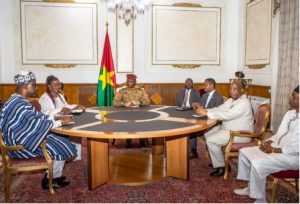
Cooperation between friendly neighboring countries is intensifying, with Guinea, Mali and Burkina Faso announcing the Bamako-Conakry-Ouagadougou axis.
Most recently, on February 1, the Prime Minister of Burkina Faso made a working and friendly visit to Mali. During this visit, the authorities of both countries drew conclusions that could be decisive for further strategic development in the period ahead. “As long as we remain isolated, we are fragile,” said the Prime Minister of Faso, Apollinaire Joachim Kyélem de Tambela.
“We found that for a long time, we have looked elsewhere instead of looking at ourselves when we have so many similarities together, so many challenges and a common destiny,” said the emissary of the President of Faso.
Of course, looking elsewhere, the Prime Minister was referring to Mali and Burkina Faso’s relationship with France, which has failed in helping its former colonies solve their security problems. Over the years of its presence, it has developed nothing but mistrust and resentment among the people of the Sahel region. Both countries have now given up on French military assistance and are determined to solve their common problems themselves. One possibility is to create a Mali-Burkina Faso federation, which would bring together important sectors of the countries and make them stronger.
And now, shortly thereafter, a new diplomatic meeting has yielded information on a new member of the coalition. The Minister of Foreign Affairs and International Cooperation and his counterparts from Burkina Faso and Guinea, Olivia Ragnaghnewendé ROUAMBA and Dr. Morissanda KOUYATE, held a working session this Thursday, February 9, 2023, in Ouagadougou, to discuss several issues of common interest, including the strengthening of bilateral and tripartite relations as well as coordination with subregional and regional organizations.
Final press release of the tripartite meeting of the Ministers of Foreign Affairs of the Republic of Mali, Burkina Faso and the Republic of Guinea calls for a formalized and institutionalized alliance in all areas. On the economic front, the declaration promises to integrate electrical infrastructure among the three partners, integrate their mining industries, open up the movement of people and goods, and build a railroad linking the three capitals along a new transport and trade corridor.
Such an alliance is the logical continuation of the three countries’ policy of refusing cooperation with France and strengthening the state at the expense of domestic forces and new partners.






